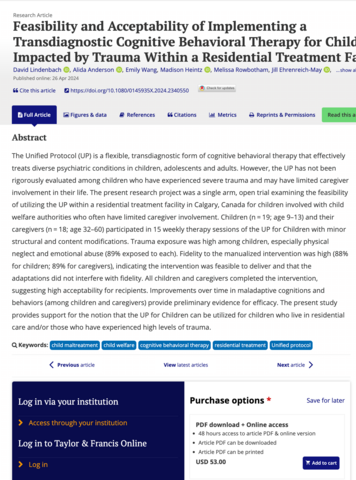The Unified Protocol (UP) is a flexible, transdiagnostic form of cognitive behavioral therapy that effectively treats diverse psychiatric conditions in children, adolescents and adults. However, the UP has not been rigorously evaluated among children who have experienced severe trauma and may have limited caregiver involvement in their life.
The present research project was a single arm, open trial examining the feasibility of utilizing the UP within a residential treatment facility in Calgary, Canada for children involved with child welfare authorities who often have limited caregiver involvement. Children (n = 19; age 9–13) and their caregivers (n = 18; age 32–60) participated in 15 weekly therapy sessions of the UP for Children with minor structural and content modifications.
Trauma exposure was high among children, especially physical neglect and emotional abuse (89% exposed to each). Fidelity to the manualized intervention was high (88% for children; 89% for caregivers), indicating the intervention was feasible to deliver and that the adaptations did not interfere with fidelity.
All children and caregivers completed the intervention, suggesting high acceptability for recipients. Improvements over time in maladaptive cognitions and behaviors (among children and caregivers) provide preliminary evidence for efficacy. The present study provides support for the notion that the UP for Children can be utilized for children who live in residential care and/or those who have experienced high levels of trauma.

